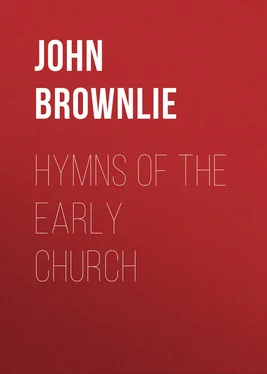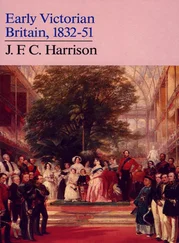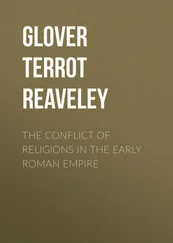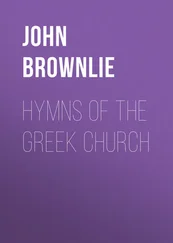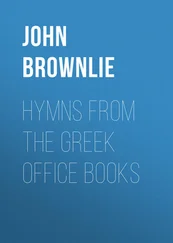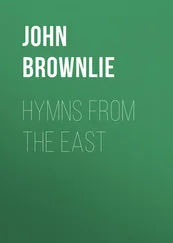John Brownlie - Hymns of the Early Church
Здесь есть возможность читать онлайн «John Brownlie - Hymns of the Early Church» — ознакомительный отрывок электронной книги совершенно бесплатно, а после прочтения отрывка купить полную версию. В некоторых случаях можно слушать аудио, скачать через торрент в формате fb2 и присутствует краткое содержание. Жанр: foreign_antique, foreign_prose, на английском языке. Описание произведения, (предисловие) а так же отзывы посетителей доступны на портале библиотеки ЛибКат.
- Название:Hymns of the Early Church
- Автор:
- Жанр:
- Год:неизвестен
- ISBN:нет данных
- Рейтинг книги:4 / 5. Голосов: 1
-
Избранное:Добавить в избранное
- Отзывы:
-
Ваша оценка:
- 80
- 1
- 2
- 3
- 4
- 5
Hymns of the Early Church: краткое содержание, описание и аннотация
Предлагаем к чтению аннотацию, описание, краткое содержание или предисловие (зависит от того, что написал сам автор книги «Hymns of the Early Church»). Если вы не нашли необходимую информацию о книге — напишите в комментариях, мы постараемся отыскать её.
Hymns of the Early Church — читать онлайн ознакомительный отрывок
Ниже представлен текст книги, разбитый по страницам. Система сохранения места последней прочитанной страницы, позволяет с удобством читать онлайн бесплатно книгу «Hymns of the Early Church», без необходимости каждый раз заново искать на чём Вы остановились. Поставьте закладку, и сможете в любой момент перейти на страницу, на которой закончили чтение.
Интервал:
Закладка:
Another name associated with the rise of sacred Latin poetry is that of Ambrose, Bishop of Milan. It will ever be to the glory of this fourth-century Father that Augustine ascribed to him his conversion, and sought baptism at his hands. His illustrious convert tells, in the ninth book of his “Confessions,” how the bishop defended the churches of Milan against the intrusion of Arian modes of worship, in spite of the efforts put forth by Justina, mother of the Emperor Valentinian, to obtain one of the basilicas for the use of the party she favoured. Alarmed by a report that he might be removed by force, the devout people of the city surrounded the bishop day and night, ready to die with him rather than allow him to be apprehended.
He, on his part, to stimulate their zeal and sustain their courage, supplied them with hymns to sing in honour of the Trinity. “Then,” writes Augustine, “it was first instituted that, after the manner of the Eastern churches, hymns and psalms should be sung, lest the people should wax faint through the tediousness of sorrow; and from that day to this the custom is retained, divers (yea, almost all Thy) congregations throughout other parts of the world following herein.” Well nigh a hundred hymns have at one time or another passed under the title Ambrosian, but the number of authenticated pieces is pitiably small, not exceeding four. In that small group the Te Deum laudamus , at one time ascribed to the Bishop of Milan, does not find a place. For, as in the case of the Gloria in Excelsis Deo , the Dies Iræ , and the Veni, Sancte Spiritus , the question who wrote the Te Deum has not received a final answer, if, indeed, it ever will. Of this, however, we may be well assured, that in the time of Jerome of the fifth century, hymns were in general use throughout the Western as in the Eastern Church. Writing to Marcellus, that most scholarly and erudite among the Fathers of the Latin Church assured his correspondent “You could not go into the field but you might hear the ploughman at his Hallelujah , the mower at his hymns, and the vine-dresser singing David’s Psalms.”
From the days of Hilary and of Ambrose, of Augustine and of Jerome, onwards through the patristic period of Church history, and all down the medieval centuries, there never failed to be a goodly succession of hymn-writers. To mention these, however briefly, would necessitate a violation of the limits of this essay. We refrain from attempting even an enumeration all the more readily, because an opportunity of giving brief biographical notices of the more outstanding contributors to the treasures of sacred Latin poetry will occur in the following pages when specimens of their masterpieces are submitted to the reader.
A few sentences may be added bearing upon the hymns contained in the service-books of the Church of Rome, and upon the relation of Latin hymnody to the Churches of the Reformation.
The use of hymns for purposes of private devotion preceded their insertion in the liturgical books of the pre-Reformation Church. Up to the seventh century the Breviaries which contained the prayers to be offered at the canonical hours had as matter to be sung only the words of Scripture. But the Spanish Council which met at Toledo in A.D. 633, laid down the general principle, that if in the worship of the sanctuary prayers may be offered in the words of uninspired men, so also may praise be sung. From that time the Churches of Western Christendom inserted hymns in their service-books, some of these compositions being of earlier date, but the larger number being of more recent times and of purely local interest. As every diocese and religious order claimed and exercised the right to construct its own ritual, Missal, and Breviary, there was endless variety of contents, considerable alterations of old compositions, and a general deterioration of quality. By the time Leo X. reached St. Peter’s chair the need for revision had become clamant. Under the direction of that Medicean Pope, the collection of hymns in use at Rome was recast; and ultimately the entire Breviary appeared in revised form, when Urban VIII. was Pope, in 1631. In this revised Roman Breviary, which is now in general use throughout the Papal communion, the hymns of earliest composers – say from Hilary to Gregory – are for the most part allowed to remain, although in some cases altered without real amendment; but in the case of those pieces which could not be conformed to the laws of correct Latinity there was an entire recasting. According to one authority, himself a revisionist, upwards of nine hundred alterations were made in the interests of metre, and the first lines of more than thirty hymns were altered. The Marquis of Bute executed a translation of the Roman Breviary in 1879, and then gave it as his deliberate judgment that the revisers, “with deplorable taste made a series of changes in the texts of the hymns which has been disastrous both to the literary merit and the historical interest of the poems.”
The Breviary of Paris has been subjected to revisions in the sixteenth, seventeenth, and eighteenth centuries. The third and latest revision was intrusted to a commission of three ecclesiastics, one of whom belonged to the Jansenist party, while another was Charles Coffin, then Rector of the University of Paris, who did the greater part of the work of editing, altering, and tinkering. Under Coffin’s manipulation only twenty-one hymns of the earlier period were retained, and the number of those from the pens of comparatively modern French writers was largely increased.
While all conversant with the subject will readily admit that both the Roman and the Parisian Breviary contain some noble verses, English versions of which are to be found in the writings of Williams, Chandler, Mant, Caswall, and Newman, as also in “Hymns Ancient and Modern,” the conviction is both general and well-founded that the principles and practice of liturgical revisionists have not been favourable to the interests of purity and simplicity in the case of ancient Latin hymnody.
Coming now to the relation in which Latin hymnology stands to the movement and Churches of the Reformation, it is to be noted that Luther showed his appreciation of what was good in the Church of his childhood when he rendered into the language of the Fatherland sixteen old hymns, twelve of these being taken from the Latin and the remaining four from the Old German of the Middle Ages. In his Colloquia Mensalia , the sturdy Protestant is to be heard censuring Ambrose as a wordy poet, but extolling the Rex Christe Factor omnium of Pope Gregory as the best hymn ever written. As with Luther, so with Melancthon and Zwingli and their immediate followers. They published collections and translations of the old Latin hymns, and they continued the use of such compositions in their public worship to a limited extent, even after they had ceased to employ the Latin tongue in Church services.
It is well known, at least to Anglican clergymen, that the Church of England Book of Common Prayer contains certain “Canticles,” to be used on Sundays and week days. Thus, after the Old Testament lesson has been read, the rubric provides that “there shall be said or sung in English the hymn called Te Deum laudamus daily throughout the year.” As an alternative to this great Creed hymn of Western Christendom there may be said or sung “this canticle, Benedicite, omnia opera ,” that is, the Song of the Three Children, a part of the Greek addition to the third chapter of Daniel, and a paraphrase or expansion of the 148th Psalm. Then in the Ordinal of the Church of England, which provides for “the ordering of Priests” and “the consecration of Bishops,” there is a stage at which there is to be sung or said, Veni, Creator Spiritus . Of this hymn two English metrical versions are given in the Prayer Book of 1662 – that presently in use, an older and more diffuse rendering, and one more terse and spirited, the product of Bishop Cosin.
Читать дальшеИнтервал:
Закладка:
Похожие книги на «Hymns of the Early Church»
Представляем Вашему вниманию похожие книги на «Hymns of the Early Church» списком для выбора. Мы отобрали схожую по названию и смыслу литературу в надежде предоставить читателям больше вариантов отыскать новые, интересные, ещё непрочитанные произведения.
Обсуждение, отзывы о книге «Hymns of the Early Church» и просто собственные мнения читателей. Оставьте ваши комментарии, напишите, что Вы думаете о произведении, его смысле или главных героях. Укажите что конкретно понравилось, а что нет, и почему Вы так считаете.
